The Voice referendum: Peter Dutton claims PM acted against advice
Opposition Leader Peter Dutton feels a “sense of relief” at the Voice referendum result and says Anthony Albanese was “warned not to take the country down this divisive path”.
National
Don't miss out on the headlines from National. Followed categories will be added to My News.
Opposition Leader Peter Dutton has described a “sense of relief” following the defeat of the Voice referendum, as leaders scramble to find a new way forward.
Australian’s resoundingly rejected the proposed Voice to Parliament in a national ballot on Saturday, with only one state or territory reporting a majority “yes” vote.
After leading the “No” campaign, Mr Dutton said he felt relieved waking up on Sunday and had feared the country would have “changed” for the worse had it passed.
“Most importantly, I don’t think we would’ve got the practical outcomes for Indigenous Australians that we all want,” Mr Dutton told 60 Minutes reporter Amelia Adams.
“There is (reason to celebrate). We live in the greatest country in the world. We should celebrate the success that we’ve got within Indigenous communities now.
“Had we enshrined the Voice, I think we would’ve put at risk some of the success … we have to listen to the verdict … If we can do that, there is opportunity for a bright future.”
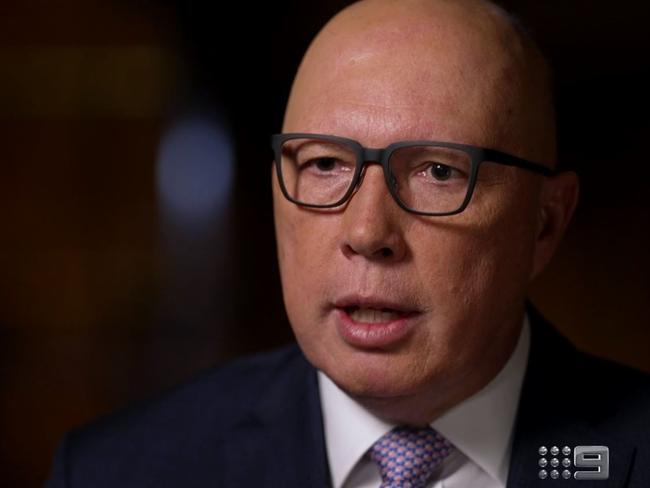
The Liberal leader hit back in his interview with 60 Minutes at criticism over his role in the No campaign, which was described by prominent Yes campaigner Thomas Mayo as “disgusting”.
“One in two Labor voters who have voted no, they haven’t been influenced by the campaign that I’ve run. They’ve been influenced by the fact the detail just wasn’t there,” Mr Dutton said.
“The Prime Minister acted against advice. He was warned not to take the country down this divisive path, and he made the decision to keep the design of the Voice from the people.
“For his own reasons – for his own motivations and self interest – the Prime Minister thought that he could have his Redfern moment. I don’t think that is the leadership Australians want. “It should be about our country, about Indigenous Australians. About a moment of unification. And, he (Prime Minister Anthony Albanese) has squandered that opportunity.”
‘TRUMPIAN TACTICS’, ‘PATHETIC’: YES SUPPORTERS UNLEASH
Sydney Lord Mayor Clover Moore has blasted the “ugly, Trumpian tactics” and “harmful misinformation” perpetuated by the ‘No’ campaign following the crushing defeat of the proposed Indigenous Voice to Parliament.
“It’s a sad, sad day,” Ms Moore said in a statement released on Sunday following the referendum defeat, adding that the outcome was “devastating and tragic”.
“While I’m grateful that the vast majority of the City of Sydney accepted the generous invitation from First Nations communities, I share your profound disappointment and sadness at the overall result and the rejection of this opportunity to build a brighter future for all.”
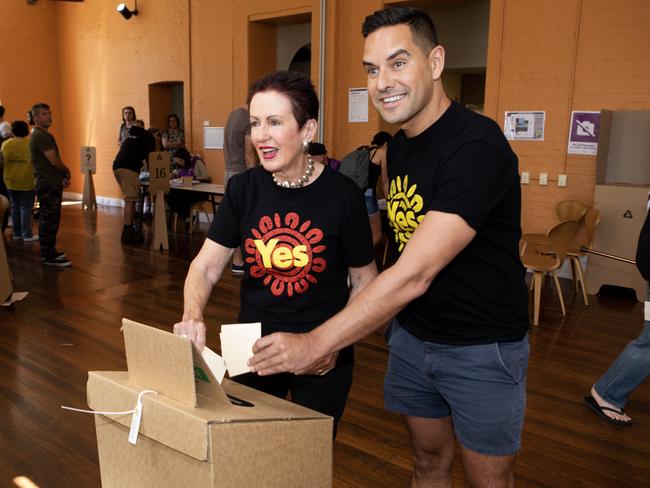
Expressing her frustration at the tactics used by Voice opponents, Ms Moore said she was “bitterly disappointed by a mean, ungenerous and negative political campaign”.
The No vote in NSW overall is 59 per cent.
Ms Moore’s council, City of Sydney, has joined Sydney’s Inner West Council in flying Aboriginal flags at half mast in the wake of the referendum defeat.
The Aboriginal flag will be lowered to half-mast at Sydney Town Hall.
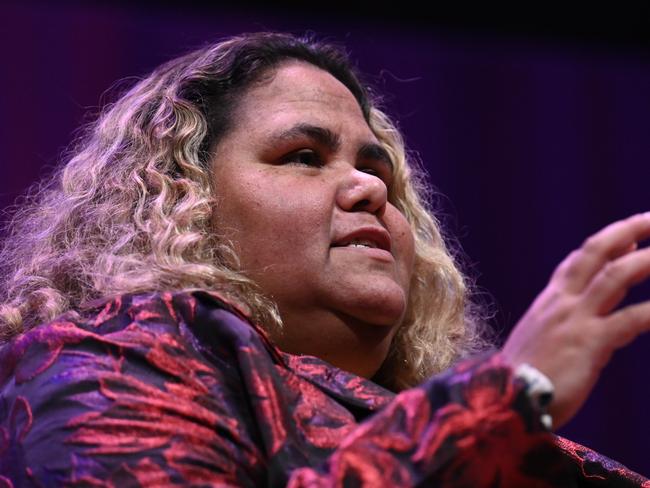
Aboriginal activist Sally Scales, a Pitjantjatjara woman who is on the board of the Uluru Statement from the Heart, used social media to launch her tirade at the Labor Party.
“This was a devastating result that keeps our people in the status quo. It is bleak. The PM was insulting & pathetic,” she wrote on X.
“How dare he. A cop out. Albanese and the ALP will not accept the lies that we put up with.
“We have been rejected by the Australian people. Reconciliation is dead.”
CASH BLASTS PM FOR ‘PUTTING AUSSIES THROUGH VOICE PAIN’
A visibly shaken Anthony Albanese called on Australians to unite in finding the solutions to address Indigenous disadvantage after the resounding defeat of the historic Voice referendum.
It came as Opposition legal affairs spokeswoman Michaelia Cash accused the PM of “putting Australians through pain” for pushing ahead with a Voice proposal without bipartisan support.
“The last 12 months have been really traumatic for so many Australians, regardless of whether you voted yes or no last night,” Senator Cash told Sky News on Sunday morning.
Australians overwhelmingly rejected the referendum to enshrine an Aboriginal and Torres Strait Islander Voice in the constitution on Saturday, with all six states on track to officially reject the proposal.
At 6am (AEDT) on Sunday, the national tally stood at 60 per cent for the No vote and 40 per cent for Yes.
Tasmania, NSW, Victoria and South Australia were all called for No by Sky News Australia before counting had even begun in Queensland, Western Australia and the Northern Territory.
The ACT was the only jurisdiction firmly voting Yes.
Voters in Queensland were most against the proposal for constitutional change, with 68 per cent of votes cast for the No.
The No camp also resonated with NSW and Victoria voters, who rejected the referendum 59 per cent and 54 per cent respectively.
South Australia returned a 64 per cent vote for No, while 59 per cent of Tasmanians and 64 per cent of WA voters voted against the change.
Just 38 per cent of NT voters were in favour of the proposal.
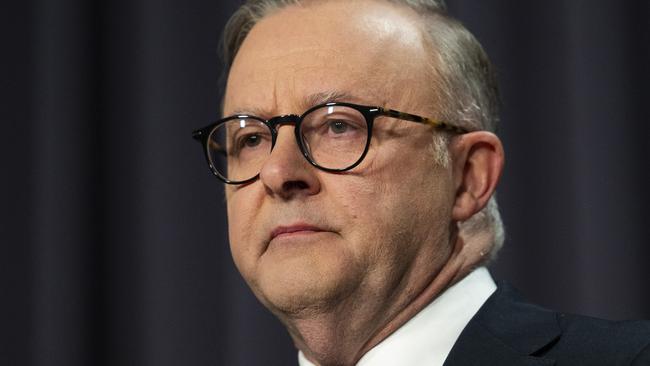
Speaking hours after the vote was called on Saturday evening, the Prime Minister said the millions of Australians who had backed the referendum with “hope and good will” must now take the result with the “same grace and humility”.
“Tomorrow we must seek a new way forward with the same optimism,” he said.
Invoking Winston Churchill, Mr Albanese said “success is not final, failure is not fatal – it is the courage to continue that counts”.
“We intend, as a government, to do what we can to close the gap,” he said.
“To do what we can to advance reconciliation, to do what we can to listen to the First Australians.”
Mr Albanese said the government had “given their all” to the Voice, but “when you aim high, sometimes you fall short. As Prime Minister I will always take responsibility for the decisions I have taken and I will do so tonight.”
Mr Albanese said Australians must now take the country beyond the debate, without forgetting “why we had it in the first place”.
“Too often in the life of our nation, and in the political conversation, the disadvantage confronting Aboriginal and Torres Strait Islander people has been relegated to the margins,” he said.
“There is a new national awareness of … (Indigenous disadvantage). Let us channel that into a new sense of national purpose to find the answers.”
Yes23 campaign director Dean Parkin lamented that the Yes team had been unable to reach well-meaning Australians who had doubts about the Voice proposal.
He accused the No case of fuelling voters’ concerns with “what has been the single largest misinformation campaign this country has ever seen”.
Claims Indigenous people would take back land, raise taxes, veto government decisions and control money ran rampant on social media, despite the Yes case consistently refuting them.
Mr Parkin said some parliamentarians had “very incorrectly and dishonestly” waged a campaign that the Voice would result in division in Australia.
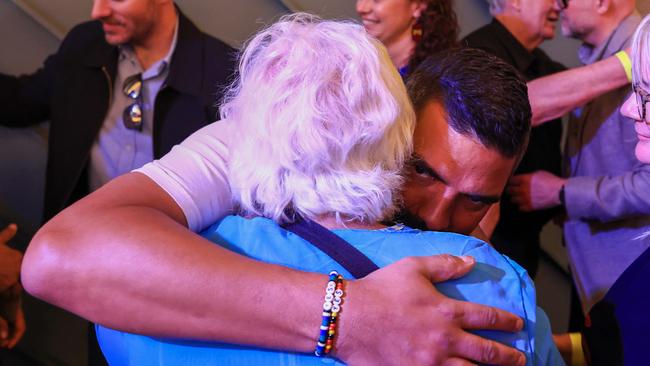
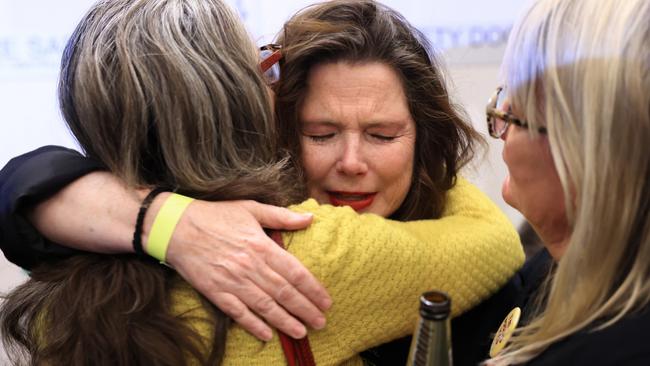
Opposition leader Peter Dutton defended his stance on the Voice and said “at all times” in the debate he had criticised “what I consider to have been a bad idea – to divide Australians based on their heritage or the time at which they came to our country”.
“The Coalition, all Australians, wants to see Indigenous disadvantage addressed.” he said at an event in Brisbane.
“We just disagree on the Voice being the solution.
“And while yes and no voters may hold differences of opinion, these opinions of difference do not diminish a love for our country or our regard for each other.”
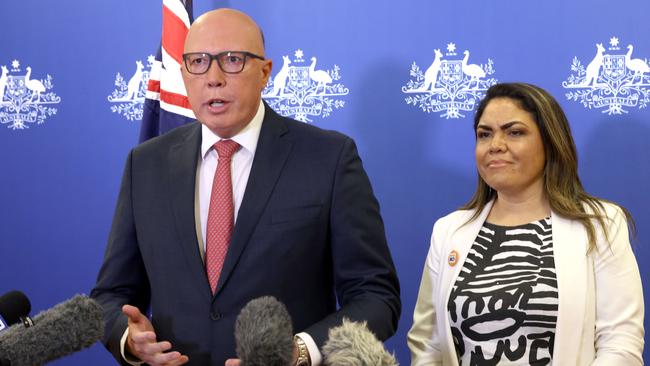
Mr Dutton took aim at Mr Albanese for failing to provide detail on the Voice proposal, and said focus must return to other issues like cost of living.
“Importantly, we must also redouble our efforts to improve outcomes for Indigenous Australians in those disadvantaged communities and to Close the Gap,” he said.
“That includes an urgent need to boost law and order, to increase school attendance and employment at many remote communities.”
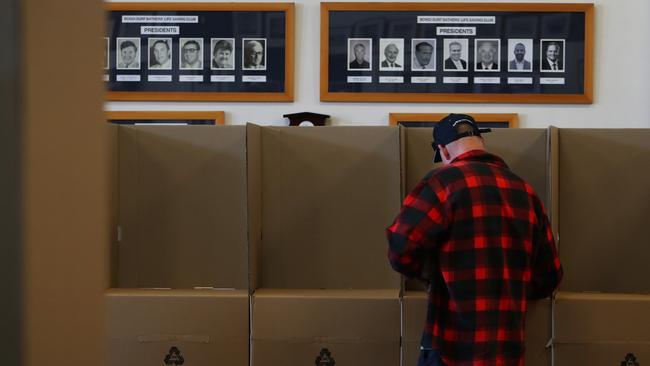
Coalition Indigenous Australians spokeswoman Jacinta Nampijinpa Price rejected accusations the No camp had pushed misinformation, instead attacking the government for running a “no information” campaign.
“The Australian people want practical outcomes, a unified country where we can move forward together,” she said.
Senator Price thanked the Australian people for “believing in our great nation and the goodwill of this country”.
“The vast majority of Australians want what’s best for every one of us, including the most marginalised Indigenous Australians,” she said.
She said it was time for a new era in Indigenous policy and that the nation needed to “step away from grievance”.
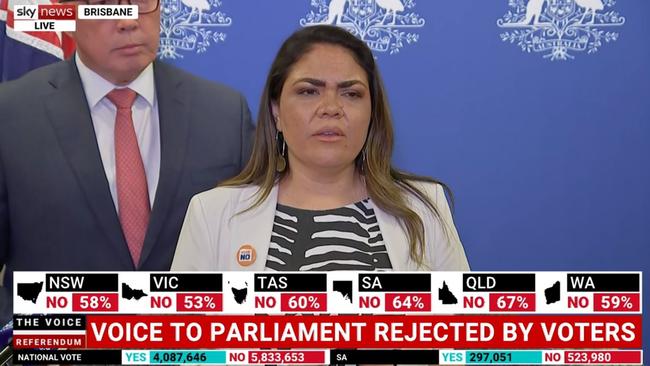
Senator Price attacked academics and activists in inner city areas who “think they know better” for Indigenous Australians.
“Attempting to bring about change through grievance has evidently got us nowhere,” she said.
“It is time to accept that we are all part of the fabric of this nation, that Indigenous Australians are also Australian citizens.
“That Indigenous children, their human rights should be upheld, just as any other kids”.
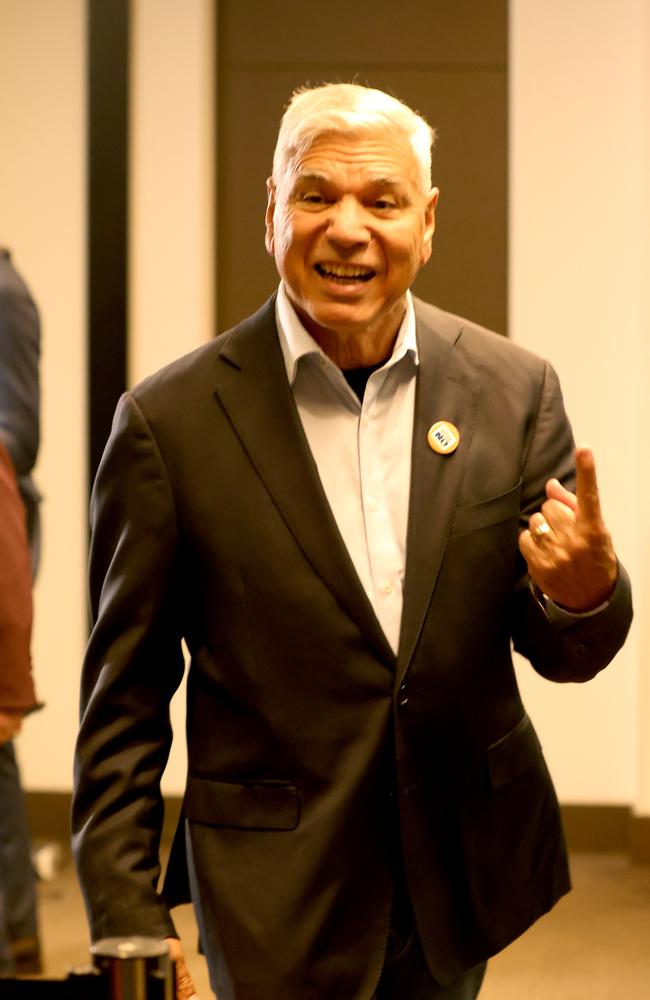
Fair Australia spokesman Warren Mundine said migrant communities and regional anti-Voice campaigners had been key to the No campaign’s success, adding the defeat of the referendum was “not a celebration”.
“Sure people are happy because they worked really hard on the campaign, but for us it is about tomorrow, we will have a beer or a lemon squash but there will be no dancing and no bands and no John Farnham,” he said.
“We are going to reach out to those Australians who voted for us, because we’ve got to fix these issues that are affecting Indigenous communities.”
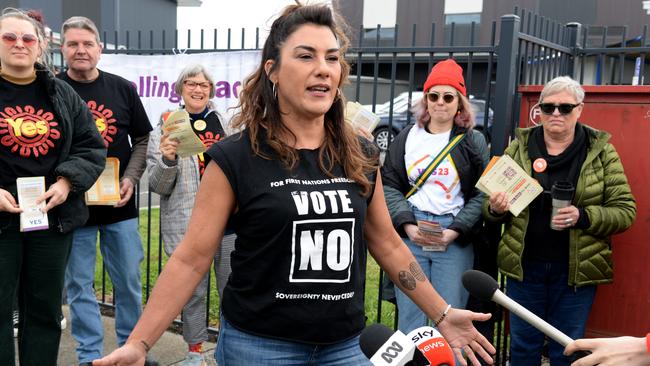
Co-author of the Calma-Langton report Tom Calma said misinformation spread by No campaigners had caused the referendum to fail as he lamented a “disappointing” result.
Mr Calma, also a member of the referendum working group, also said Aboriginal people were “sick and tired” of being political footballs, and being “shoved around” by successive governments.
“We are sick and tired of it as Aboriginal and Torres Strait Islander people, of being the political football at the behest … of what governments want,” he said.
FOLLOW THE UPDATES AND REACTION BELOW
WORLD REACTS TO NO VOTE
The referendum result has made headlines around the world.
In the UK, the BBC says the result will see Anthony Albanese search ”for a way forward” and described the Coalition as “resurgent” and “keen to capitalise on its victory”, news.com.au reports.
The Times said it was a “a huge blow” for those who viewed the Voice as a chance to close the gap between Australia’s Indigenous people and the rest of the population.
France’s Le Monde said the referendum “sparked a deeply rancorous and racially tinged debate that exposed a gulf between First Nations people and the white majority”.
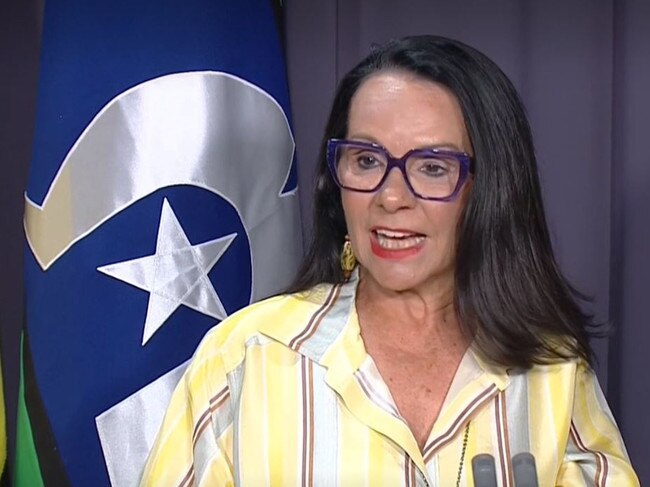
In the US, The New York Times described it as a moment “crushing Indigenous hopes”.
The Wall Street Journal said the No vote reflected “deep divisions over how best to address the legacy of colonialism and improve the lives of the nation’s first inhabitants”.
CNN noted that the Voice’s promise of change for Indigenous Australians “couldn’t deliver”.
“With a two-letter word, Australians struck down the first attempt at constitutional change in 24 years, a move experts say will inflict lasting damage on First Nations people and suspend any hopes of modernising the nation’s founding document,” the outlet reported.
‘TIME FOR TREATY’: THORPE
Firebrand Independent senator Lidia Thorpe, who quit the Greens to campaign against the Voice, has renewed her demand for a treaty between the Federal Government and Aboriginal and Torres Strait Islander people.
Ms Thorpe told ABC Radio in Melbourne the referendum should “never have happened”.
“A large number of First Peoples voted no and have been against this referendum from the beginning. There were many others that voted no out of love and solidarity with First Peoples fighting for justice,” she said in a statement.
She said the Prime Minister needs to sit down with her and the Blak sovereign movement to work out a way forward.
“The Albanese government promised to pursue all three elements of the Statement from the Heart, and there is no excuse to delay truth and treaty any further.”
INDIGENOUS SUPPORT FOR YES
Remote polling results show Aboriginal and Torres Strait Islander people strongly supported the Voice across the Northern Territory, far north Queensland, the Gulf and Central Australia.
Analysis of Saturday’s referendum results from remote polling vans and booths in areas with a high Indigenous population show Indigenous people in the Northern Territory and regional Queensland consistently voted in favour of the Voice, while communities in north west NSW leaned No and northern South Australia was mixed.
There were 20 Australian Electoral Commission (AEC) remote polling teams that went to towns and communities in the seat of Lingiari, which covers almost all of the Northern Territory outside of Darwin.
Of the 11,029 votes collected, 72 per cent of people voted Yes.
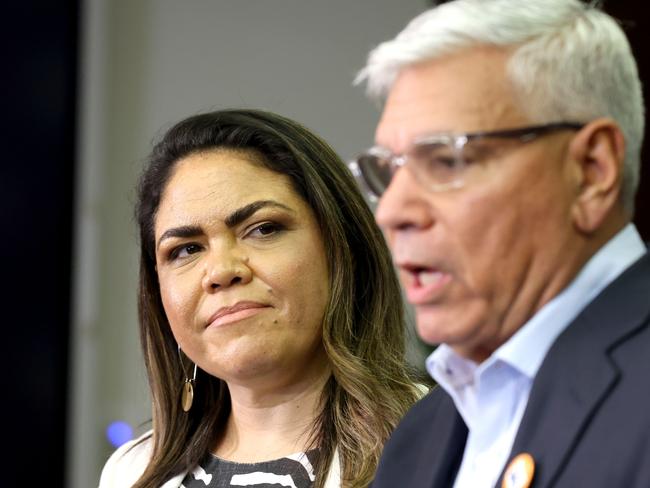
Speaking after the defeat of the referendum, Indigenous Australians spokeswoman Jacinta Nampijinpa Price accused the Yes case of “misinformation” for highlighting polls suggesting about 80 per cent of Aboriginal and Torres Strait Islander people backed the Voice.
“I knew, having spoken to people throughout the Northern Territory, to Indigenous people … right across the country … that a vast group of Indigenous Australians did not support this proposal,” she said.
But Health Minister Mark Butler said it was clearly a “furphy” to suggest there was not overwhelming support for the Voice among First Nations’ people.
“That was put to rest by some of those results (on Saturday),” he told Sky News. “Of course, there was not complete uniformity of opinion in the Aboriginal and Torres Strait Islander community, there’s not about anything in any community.”
— Clare Armstrong
SA’S TOTAL REJECTION OF VOICE
Every state in Australia rejected the Voice to parliament on Saturday. But only one said No in all of its electorates.
South Australia recorded a whopping 64.4 per cent No vote, the second highest in the country after Queensland.
Even the state’s inner-city seats delivered tight No victories, while inner-city electorates in Melbourne, Sydney and Brisbane backed Constitutional change.
Voters in the seat of Adelaide, held by Labor’s Steve Georganas, supported No with 50.4 per cent of the votes, the tightest margin in the state.
The No wave broadened as the electorates moved away from the city’s core.
Regional and outer suburban South Australia delivered crushing blows to the Yes camp, with the seats of Grey, Spence and Barker all producing No percentages above 70 per cent.
The South Australian Labor government, led by Premier Peter Malinauskas, has legislated a state-based Voice to Parliament, with elections to the new body set to begin in March 2024.
– Duncan Evans, NewsWire
NOT OUR ONLY CHANCE AT HEALING: FORMER PM
Former Prime Minister Julia Gillard says the referendum result is a “moment of reflection” for Australians, who must “maintain hope”.
“While the referendum result is not the one I had hoped for, I remain hopeful that all Australians want to heal divisions and create a better future together,” she said in a post to X, formerly known as Twitter.
“The referendum result will be distressing particularly for many First Nations people.”
Ms Gillard said there will be more chances at reconciliation down the road, calling on Australians to be hopeful.
“As we emerge from this chapter in our nation’s story, we must maintain hope that a better future is possible,” she said.
“This was not our only chance at healing.”
WHAT ABOUT WYATT? CASH’S OVERSIGHT
Coalition legal affairs spokeswoman Michaelia Cash says the dust needs to settle before the opposition will reveal what policies it will push following the referendum’s failure beyond calling for an audit for funding for Indigenous programs.
But in an awkward blunder, she claimed the Coalition did not have a person of “lived experience” in its ranks before Senator Jacinta Nampijinpa Price.
Asked by Sky News why the Coalition did not audit the funding during its nine years in power, Cash replied: “We never had senator Jacinta Nampijinpa Price”.
“For the first time in Australia’s history, we have someone with lived experience fronting Australia and being able to carry the conversation and quite frankly, we now need to back senator Jacinta Nampijinpa Price in.”
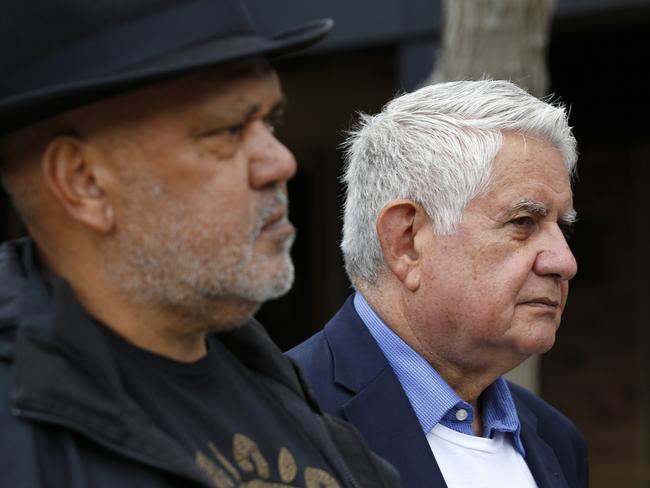
But the first Indigenous person to hold the Indigenous Australians portfolio was Ken Wyatt, Ms Cash’s former WA Liberal colleague, who quit the party earlier this year in protest after opposition leader Peter Dutton announced the Liberal Party would oppose the referendum.
— Courtney Gould, NewsWire
WE STILL BACK ULURU: MARLES
Deputy Prime Minister Richard Marles says the government won’t shy away from the Uluru Statement from the Heart but has drawn a line under the potential for another referendum.
The Coalition has pushed for a second referendum to be held to recognise Indigenous Australians in the Constitution without enshrining the Voice.
But Mr Marles again reiterated Labor would not move to another referendum.
“We were committed to putting this to the Australian people and we've done that, and that’s that. Now, we gave it our best shot … but we’ve come up short,” he told ABC’s Insiders.
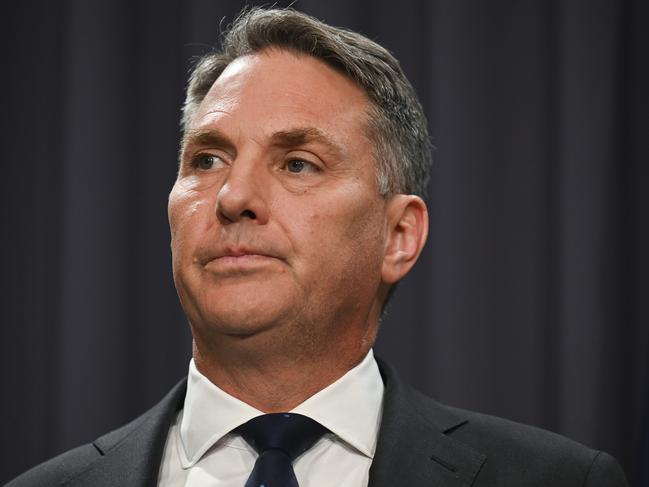
He said the government had weighed up whether it was best to press on when it became clear the Coalition would not be supporting the referendum.
“Did we understand that it was more difficult? Of course we did. But we didn’t go to the election saying, ‘We will take this to the Australian people so long as Peter Dutton agrees’,” he said.
“In terms of specific steps and what we do now … we need to let the dust settle.”
— Courtney Gould, NewsWire
ACT STAND ALONE IN VOTE COUNT UPDATE
At 10am on Sunday, the national tally stood at 60 per cent for the No vote and 40 per cent for Yes.
The ACT, which like the Northern Territory is only included in the national total, is the only jurisdiction to have returned a Yes vote.
Voters in Queensland were most against the proposal for constitutional change, with 68 per cent of votes cast for the No.
The No camp also resonated with NSW and Victoria voters, who rejected the referendum 59 per cent and 54 per cent respectively.
Meanwhile, South Australia returned a 64 per cent vote for No, while 59 per cent of Tasmanians and 63 per cent of WA voters voted against the change.
Just 38 per cent of NT voters were in favour of the proposal.
‘OVERCONFIDENT’: WHY YES FAILED
A Liberal MP who quit Peter Dutton’s frontbench to campaign for the Voice to Parliament has outlined the two major reasons why the referendum failed in a blunt television interview.
Julian Leeser was Liberals legal affairs and Indigenous Australians spokesman before the party decided to campaign against the referendum.
Speaking with ABC’s Insiders on Sunday morning, he said Labor’s “overconfidence” and the abandonment of the Voice process started by Mr Wyatt in the former Coalition government were factors behind Australia’s rejection.
“I think the first was to abandon the process that Ken Wyatt began by rolling out the local and regional Voice bodies first,” he said.
“They would have created a sense of confidence and understanding of what the Voice would do, when we talk about a national body.
“The second was a parliamentary overconfidence because of the high polls of this last year, because of the government's own electoral success at the last election.
Queensland Premier Annastacia Palaszczuk has pledged to push ahead with reconciliation and
— Courtney Gould, NewsWire
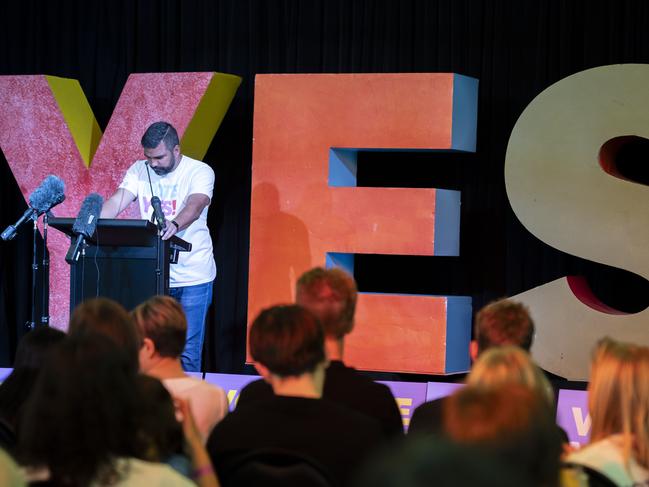
VOTERS ‘NOT READY’ FOR VOICE: QLD PREMIER
Queensland Premier Annastacia Palaszczuk has pledged to push ahead with reconciliation and acknowledged the “strong feedback” against an Indigenous Voice.
Queensland led the nation in opposing the Voice, with 68 per cent of people voting No.
Ms Palaszczuk, who supported the Voice, said the “Australian people” had spoken.
“Their Voice tells me they’re not ready,” she said. “I respect that. They never get it wrong.”
She said improving the wellbeing of First Nations peoples would continue to be a priority.
— Hayden Johnson, Courier Mail
THORPE UNLEASHES ON YES CAMPAIGNER
Victorian Senator Lidia Thorpe has slammed Yes campaigner Marcus Stewart as a hypocrite, after he demanded people stop playing politics and instead work to improve the lives of Indigenous Australians.
Mr Stewart, the husband of Victorian Labor Senator Jana Stewart, on Sunday accused Peter Dutton of “kicking Aboriginal and Torres Strait Islander communities in the face” while giving his referendum victory speech.
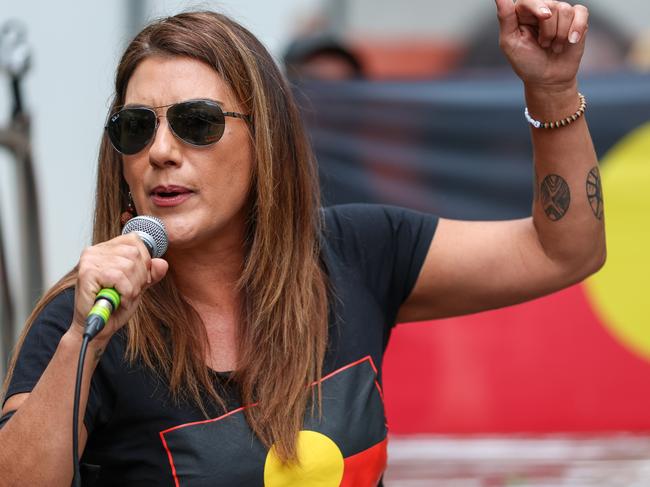
“When he (Dutton) come out and started criticising Aboriginal activists, again, stereotyping Aboriginal people … playing personal politics, this is bigger than that,” he said.
“Don’t call people names. Don’t continue to do the division. Let’s get to work. Because our communities and our people are suffering, that’s what’s the priority.”
Senator Thorpe said she was not defending the Opposition leader’s comments but called out the hypocrisy.
“Marcus Stewart is also politically motivated because of who his wife is and the fact that he wants to also become a Labor politician one day he told me that himself,” she said.
— Jade Gailberger, Herald Sun
COUNCIL FLIES ABORIGINAL FLAG AT HALF MAST
A Sydney council will fly Aboriginal flags at its council buildings at half mast this week in the wake of No win.
Inner West Mayor Darcy Byrne said the move came out of “respect” for what Indigenous leaders had called for, The Australian reports.
He urged other organisations to follow suit.
The Inner West council area overlaps with Prime Minister Anthony Albanese’s electorate Grayndler, which voted Yes to the tune of 75 per cent.
‘RACISM EXPOSED’: UN WATCHDOG CONDEMNS NO VOTE
United Nations watchdog has condemned the defeat of the Indigenous Voice, saying it “exposes the hidden racism” within Australia and harms our international reputation, writes Tom Minear.
Professor Surya Deva, the UN Special Rapporteur on the Right to Development, issued a scathing statement, having previously urged Australians to support the Voice.
“The Voice result not only exposes the hidden racism within the Australian society but also highlights that a majority of Australians are still not willing to recognise the human rights of Indigenous Peoples,” he said.
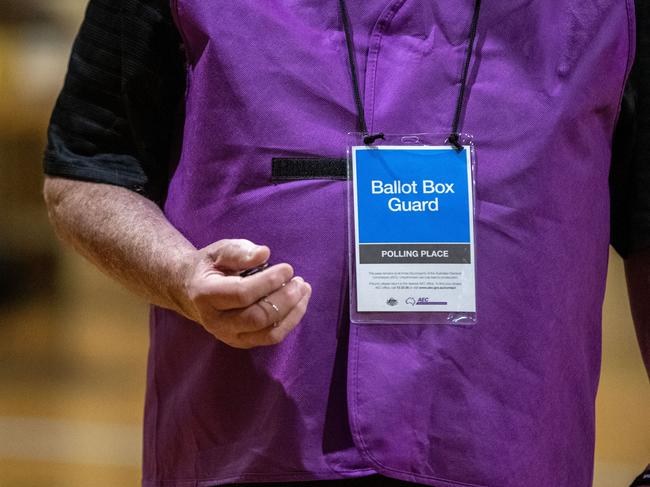
Prof Deva, the director of Macquarie University’s Centre for Environmental Law, said Australia had already been “lagging behind its peers” in recognising the rights of Indigenous Australians in line with the UN Declaration on the Rights of Indigenous Peoples.
“The No vote will dent further the international reputation of Australia and its people generally in terms of where they stand towards achieving reconciliation with the First Peoples,” he said.
The Special Rapporteur is appointed by the UN Human Rights Council to shine a spotlight on worldwide failures to live up to the UN’s development goals.
WHERE ARE THE BIGGEST YES AND NO VOTES?
In a country that swung towards No, one state led the Yes support.
Victoria came closest to a majority vote, with 45.45 per cent, or 1,478,552 voters making it the biggest Yes block in the country.
NSW was second, with 40.83 per cent backing Yes. Tasmania had 40.8 per cent Yes.
Victoria has a state-based Voice already in effect. But there was a clear split: comparatively affluent Melbourne inner-city suburbs going for Yes as less affluent voters in the outer suburbs and regions backed No.
The electorate of Melbourne, represented by Greens leader Adam Bandt, had the highest Yes vote in Victoria and Australia: 78 per cent Yes.
In contrast, the electorate of Scullin in the outer suburbs of northern Melbourne, was 62.6 per cent No.
A similar split emerged across the country: inner-cities backing change and outer suburbs and regions swinging heavily to No.
Only three Queensland seats backed the Voice: the divisions of Ryan, Brisbane and Griffith, all located in inner-city Brisbane. Brisbane went 56.7 per cent for Yes, the highest percentage in the state.
More than 80 per cent of voters in Central Queensland’s Capricornia electorate, by contrast, rejected the Voice, the highest No vote in the state.
– Duncan Evans, NewsWire
WHY VOICE DEFEAT IS THE PM’S FAULT
A litany of missteps by Anthony Albanese mean the PM will have to wear the blame for this disaster, writes National Political editor James Campbell.
“It was his decision on election night to put the Voice at the centre of his first term, and he made an array of errors on the journey to the polls,” Campbell writes.
“It was his decision to hold a referendum without first holding a constitutional convention. It was his decision to tie putting recognition of Aborigines and Torres Strait Islanders into the constitution to the Voice.
“Had he taken the advice to split them, recognition would have passed in a canter, meaning something might have been salvaged from this exercise.”
PM ‘PUT AUSTRALIA THROUGH PAIN’: CASH
Opposition legal affairs spokeswoman Michaelia Cash says Anthony Albanese must examine why he put Australia through a “divisive process”.
Senator Cash accused the PM of playing politics for pushing ahead with a Voice proposal without bipartisan support.
“The last 12 months have been really traumatic for so many Australians, regardless of whether you voted yes or no last night,” Senator Cash told Sky News.
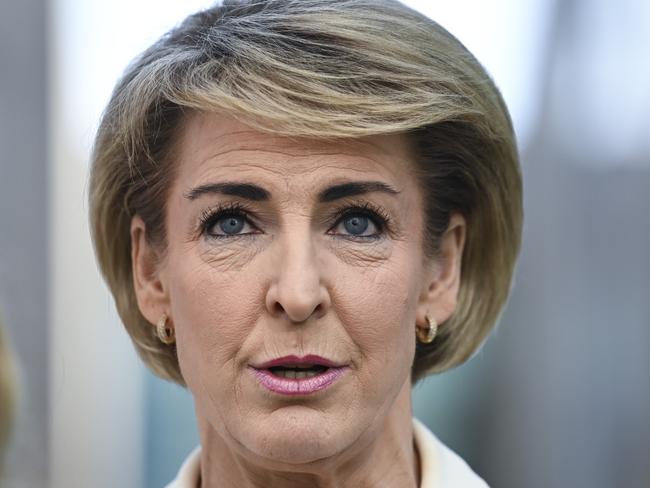
“This was the referendum that we did not need to have. Mr Albanese put politics over what could have been a bipartisan approach towards constitutional recognition of our First Nations people.
“So Mr Albanese is responsible squarely for putting Australians through the pain that he has done so over the last 12 months.
“More than that, he took his eye off the ball in relation to what really matters to the Australian people, and that is of course the cost of living crisis that has beset this country under Mr Albanese.”
‘UGLY’: BROOKE BONEY’S PLEA
As six Australian states said no to a Voice to Parliament, Indigenous presenter Brooke Boney closed Channel 9’s coverage on Saturday night with an appeal to Indigenous people.
“I wanted to … remind you all of the love we have for one another. A love that has served us for the last 60,000 years to be the longest-continuing culture of anywhere in the world. That does not happen by accident,” she said, urging Indigenous Australians to not give up on political reform.
“This is a discussion that has, at times, been inspiring and at times been ugly. We’ve seen the best and the worst of people during this campaign,” she said.
“As the sun sets on polling day, it will rise again tomorrow and our work continues – to make sure our babies are loved, our Elders are cared for, and our community is strong.”
– Eli Green, NewsWire
RECONCILIATION ‘DEAD’: LANGTON
Indigenous advocate Marcia Langton declared “reconciliation is dead” in the wake of the ‘No’ vote win.
“A majority of Australians have said no to an invitation from Indigenous Australia, with a minimal proposition, to give us a bare say in matters that affect our lives, advice that doesn’t need to be taken by the parliament,” she told NITV’s The Point. “It‘s very clear that reconciliation is dead.”
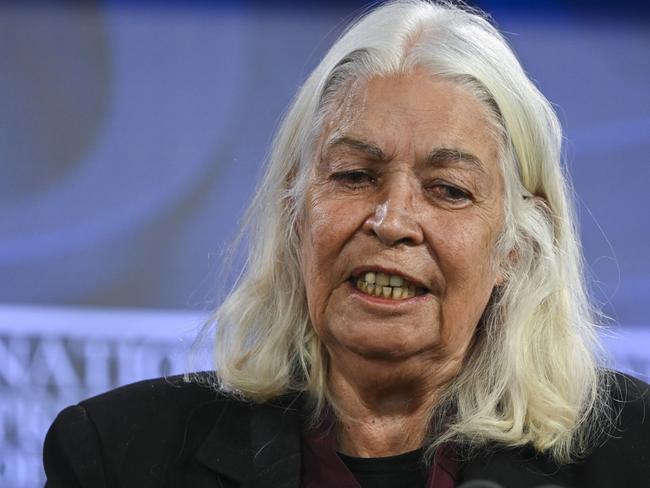
“No campaigners have a lot to answer for. In poisoning Australia against this proposition and against Indigenous Australia. They say they’re not celebrating, but let’s see how they wheel themselves out in the future … this has been a cynical political exercise by the Coalition.”
No campaigner Warren Mundine told the same TV program most Australians wanted to vote Yes, but did not because of the lack of detail on how a Voice would have operated.
Mundine insisted there would be “no celebrations” in the victorious camp.
DUTTON’S ‘POLITICAL CHANGE OF TACK’
Health minister Mark Butler has told Sky News Opposition leader Peter Dutton’s “change of tack” at the end of March eroded support for the Yes vote.
Mr Butler said work done on the Voice proposal under the previous Morrison government meant there had been a Labor belief “the bipartisan support would be there”. But that changed.
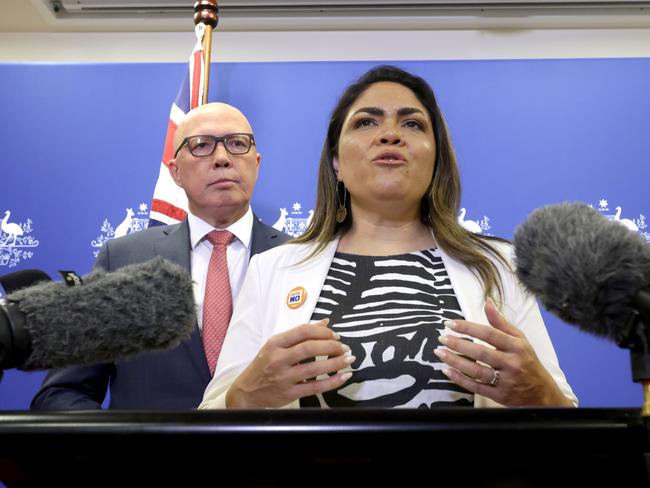
“A significant change of tack was put in place by Peter Dutton at the end of March, April, after those election defeats for the Liberal Party, first at the state level in New South Wales, then the Aston by election day. It was very difficult for us to win a referendum against really old historical forces,” he said.
He said Saturday’s vote was not a vote against reconciliation or closing the gaps in health outcomes and life expectancies.
“Now our job as government … of all people in public life, including the opposition and crossbenchers is to accept this result and find a new way forward to deal with those yawning gaps,” he said.
‘MOMENT OF GRIEVING’
Reconciliation co-chair Melinda Cliento says the referendum defeat is “very disappointing”.
“We had hoped it would be a moment that would bring Australia together, and that hasn’t proven the case,” she told the ABC on Sunday morning.
“I think what we need to do is to allow this moment of grieving. Then we’ve got to allow people to regroup and have to continue to listen to our First Nations people about what they believe will improve their lives.
“For us at Reconciliation, our work, particularly in terms of ensuring the voices are heard and tackling some of the other challenges, including trying to overcome racism … will be our focus”.
PM’S FUTURE CALLED INTO QUESTION
Anthony Albanese is facing calls to resign as Prime Minister after the failure of the referendum.
No campaigners have already begun to call for the prime minister’s head in the wake of the vote, including Sky News Host Andrew Bolt, over the “poison” generated.
South Australian Opposition Leader David Speirs said that Labor needed to “make a call”
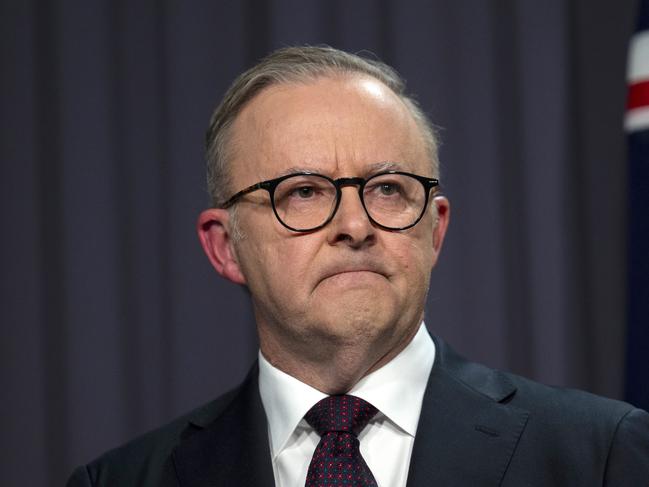
“Some people are saying he should resign. He should resign because the damage he has done to our country and to the very fabric of what it means to be Australian is, quite frankly, heartbreaking,” Mr Spiers said.
“The prime minister should think about his future. I don’t think he will resign, but there are international precedents there.”
— Eli Green, NewsWire
NO VOTE STRONGEST IN QLD
While the overall result in South Australia and the Northern Territory was a resounding No, the strongest results against the Voice were recorded in Queensland seats.
The electorate that rejected the referendum the most was Maranoa, in the state’s south east, with 84.12 per cent voters in the No camp. Flynn closely followed with 83.60 per cent, Hinkler (80.92 per cent), Capricornia (80.81 per cent), Dawson (80.80 per cent) Kennedy (80.76 per cent).
Grey, in South Australia, recorded the next most compelling No victory at 79.67 per cent.
WHO VOTED YES
The Australian Electoral Commission data as of 3am (AEDT) on Sunday showed 31 divisions voted Yes, with the strongest results in Melbourne, Victoria, with 78.05 per cent and Grayndler, NSW, with 74.47 per cent.
In Queensland, 56.68 per cent of voters in Brisbane were in favour of the Voice, followed by Griffith (56.59 per cent) and Ryan (52.69 per cent).
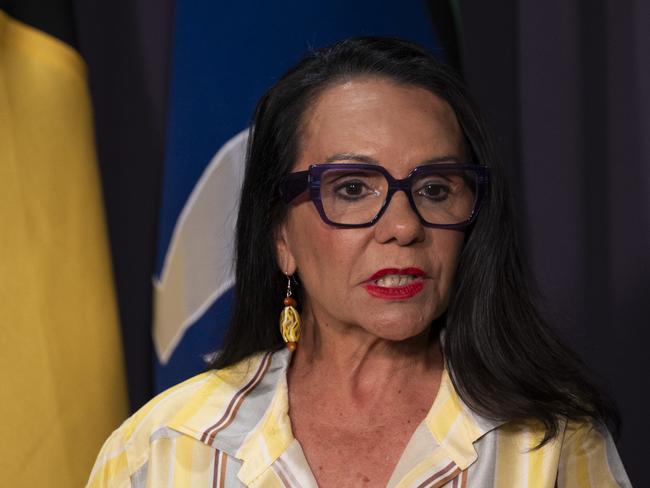
In New South Wales, the seats that voted Yes were: Bradfield (51.62 per cent), Cunningham (51.64 per cent), Grayndler (74.47 per cent), Kingsford Smith (54.97 per cent), Mackellar (50.47 per cent) Newcastle (53.48 per cent) North Sydney (59.61 per cent), Sydney (71.03 per cent), Warringah (59.09 per cent) and Wentworth (62.66 per cent)
In Victoria, Chisholm (50.10 per cent), Cooper (65.70 per cent), Fraser (56.63 per cent), Gellibrand (53.34 per cent), Goldstein (56.69 per cent), Higgins (60.63 per cent), Isaacs (50.75 per cent), Jagajaga (54.40 per cent), Kooyong (59.86 per cent), Macnamara (65.15 per cent), Maribyrnong (52.89 per cent), Melbourne (78.05 per cent) and Wills (64.99 per cent) voted Yes.
No South Australian or Northern Territory seats netted a Yes result.
Two electorates voted Yes in Western Australia, Curtin (51.07 per cent) and Perth (56.36 per cent).
Clark and Franklin had 58.03 per cent and 50.51 per cent of the vote, respectively, in Tasmania.
All three seats in the ACT voted Yes: Brean (55.93 per cent), Canberra (70.46 per cent) and Fenner (57.13 per cent).
‘F***ING EMBARRASSING’: LIME CORDIALE
ARIA award-winner rapper Briggs, of First Nations hip hop due A.B. Original, shared a post on social media on Saturday evening saying “the good people who showed up are really fkn (sic) good. thank you!”.
His Instagram post was like by more than 31,000 people and attracted comments from other artists including Lime Cordiale who said: “It’s so f***ing embarrassing. You’ve made a shit tonne of positive change in this world tho. (sic) Im (sic) sure you sway a lot of voters”.
Briggs has been involved in the Yes campaign, including releasing music for the cause and being in a short satirical film Far Enough? that went viral.
The video, made by acclaimed director Nash Edgerton, was shared in its first 24 hours on social media by Thor director Taika Waititi and actors Jason Momoa, Dacre Montgomery and Phoebe Tonkin.
DON’T ‘DWELL ON THIS HURT’: CHALMERS
Federal Treasurer Jim Chalmers urged Australians “not to dwell on this hurt or disappointment, but to come together, and work together, to address it and heal it and Close the Gap” he said in a post on X, formerly Twitter.
We acknowledge, understand & respect the nation chose a different way forward. Our job now is not to dwell on this hurt or this disappointment, but to come together, and work together, to address it and heal it and Close the Gap.@yes23au@ulurustatement#Yes23#auspol
— Jim Chalmers MP (@JEChalmers) October 14, 2023
‘TODAY IS A VERY HARD DAY’: BANDT
Greens leader Adam Bandt responded to the overwhelming rejection of the Voice saying: “Today is a very hard day”.
“To First Nations people who are hurting tonight, and the broader community who campaigned for Yes, I share your sadness and disappointment,” he said in a post shared on X.
Today is a very hard day.
— Adam Bandt (@AdamBandt) October 14, 2023
To First Nations people who are hurting tonight, and the broader community who campaigned for Yes, I share your sadness and disappointment.
The Referendum outcome follows a Trumpian campaign of misinformation led by Peter Dutton.
INDIGENOUS FLAGS AT HALF MAST
Indigenous Australians who supported the Voice will hold a week of silence to grieve the referendum outcome and “reflect on its meaning and significance”.
In an open statement released after the defeat of the national vote, Indigenous Yes campaigners and supporters announced Aboriginal and Torres Strait Islander flags will be lowering their community‘s Aboriginal and Torres Strait Islander flags to half masts for the week, and asked others to do the same.
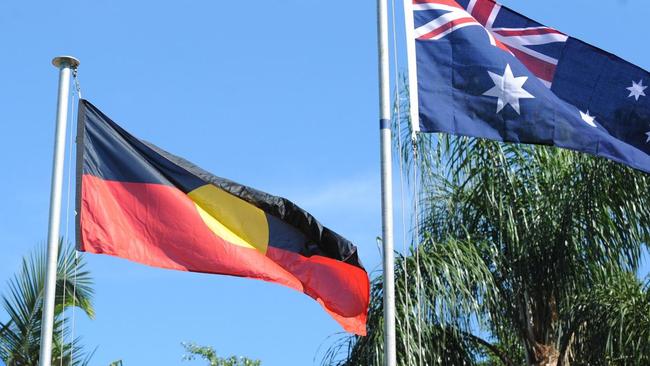
“Recognition in the constitution of the descendants of the original and continuing owners of Australia would have been a great advance for Australians,” the statement said.
“Alas, the majority have rejected it.”
‘UGLY ACTS OF RACISM’
Reconciliation Australia has released a statement following the No result of the Voice referendum, calling out “ugly acts of racism and disinformation” in the No campaign.
“Despite this setback the work of reconciliation is needed now more than ever,” the statement read.
“Reconciliation Australia has been part of the long process which led to the Uluru Statement from the Heart and the simple and modest proposition rejected tonight.
“As we grapple with this weekend’s outcome, we must also grapple with the ugly acts of racism and disinformation that have been a feature of the debate despite regular calls for respectful engagement.
“All Australians must ask ourselves whether this is a standard we are comfortable with.”
‘NOT THE RESULT WE WANTED’: WONG
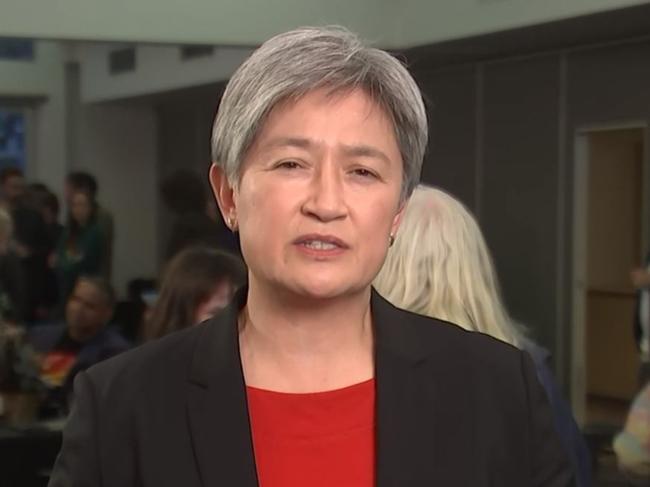
“Friends, we know this is not the result we wanted,” Foreign Affairs Minister Penny Wong said on Saturday night.
“Progress is never won easily. The history of our country, the history of advancement of rights, the history for women and for different cultural backgrounds has always been hard won.
“We will keep pressing forward. We will keep seeking to walk that path to reconciliation. We do it because it says something about our country.
“One of the things that I am going to hold on to is this; there was no one who said in this campaign that we shouldn't close the gap.”
She said that, by withdrawing his support, the Opposition Leader had derailed what might have otherwise been a successful Yes vote for the nation.
More Coverage
Originally published as The Voice referendum: Peter Dutton claims PM acted against advice




